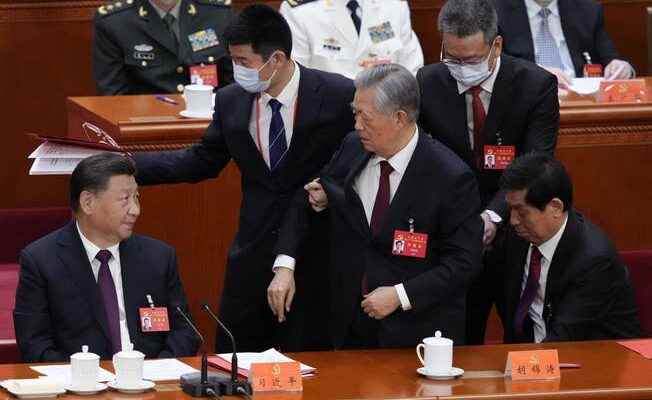Shortly before the end of the Communist Party Congress, former Chinese leader Hu was taken out of the meeting room – apparently against his will.
Hu Jintao, the predecessor of head of state and party leader Xi Jinping (left), is publicly led away from the party congress.
It is a disturbing scene that took place in Beijing late Saturday morning shortly before the end of the party congress in the Great Hall of the People. When the media representatives were let into the fully occupied hall at around eleven o’clock, two employees join Hu Jintao approach and ask him to come along. Hu sits in the front row of the hall, right next to State and Party leader Xi Jinping. Hu, China’s president from 2003 to 2013, resisted the request. After two minutes of back and forth, he finally gets up and leaves the room, supported by the two employees.
Early drama: Hu Jintao seen being led out soon after reporters are led into the main hall pic.twitter.com/pRffGZF60I
— Danson Cheong (@dansoncj) October 22, 2022
The shameful scene raises a number of questions. A discussion about Hu’s health erupted on China’s social networks. However, the state censors immediately stifled the discussions. Other observers wondered whether Xi Jinping’s expulsion was orchestrated. Hu belongs to a different camp from Xi in China’s complex political fabric.
79-year-old Hu’s health is known to be in poor health. At the beginning of the 20th Party Congress on October 16, Hu had to be led into the Great Hall of the People, supported by an assistant. But if the conference authorities had wanted to prevent the media from seeing Hu’s ailing health, he could have been persuaded to leave the hall earlier.
However, it is difficult to judge whether the move is a deliberate disempowerment or an exposure of Hu by Xi. This is countered by the fact that Xi generally carries out such “purges” discreetly and without much publicity. Also the fact that the Main news program of state broadcaster CCTV Hu showed a close-up on Saturday evening, speaks for health reasons. The state news agency Xinhua spread via Twitter that Hu was not feeling well.
Xinhuanet reporter Liu Jiawen has learned that Hu Jintao insisted on attending the closing session of the Party’s 20th National Congress, despite the fact that he has been taking time to recuperate recently.
— China Xinhua News (@XHNews) October 22, 2022
Hu’s son, Hu Haifeng, party secretary of Lishui City in Zhejiang Province, was in the room as a delegate to the party congress. If he doesn’t get any political problems in the near future, this also speaks for a health problem for Hu.
But then the question arises as to why Hu initially vehemently resisted leaving the party congress. Henry Gao, a legal expert at the Management University of Singapore, refers to the on Twitter work report, which Xi presented at the opening of the party congress. In it, the head of state and party leader criticized his predecessors in clear words.
Anyone who believes in the sickness theory should go back and re-read the 20th Party Congress Report: Why else would Xi devote 1.5 pages to what went wrong with the Party, government, economy, society, national security etc when he took office in 2012 ?https://t.co/FS1Uddslz8
— Henry Gao (@henrysgao) October 22, 2022
In fact, in the first part of this report, Xi mercilessly reckoned with his predecessors. There was “in practice” a tendency towards a “weak, hollow and watered-down leadership role for the party,” it says. And further: “Some party members were wavering in their political convictions.” In the work report, Xi also criticized that some people had lost confidence in the “socialist political system”. “Misguided thought patterns such as the worship of wealth, hedonism, egocentrism and historical nihilism” were widespread.
The leadership duo of Hu and his Prime Minister Wen Jiabao was generally considered weak, and corruption ran rampant under him. On the other hand, Xi’s predecessors tried honestly and with some success to achieve more social balance. The turbulent reforms in the 1990s had led to considerable social upheaval. In addition, a discussion, albeit tentative, about more political participation had started among Hu and Wen.
Political careers in China were often made through proximity to informal but influential groups. Hu, the then Premier Wen, but also the current Premier Li Keqiang rose to their top positions because of their association with the Communist Youth League. The predecessor duo of state and party leader Jiang Zemin and Prime Minister Zhu Rongji was considered a representative of the so-called “Shanghai faction”, which is characterized by its more business-friendly course. Since taking office, Xi has curbed the influence of informal groups.
Dealing with previous governments is tricky in China. Usually, long after their political departure, they exert considerable influence behind the scenes on political events with the help of established cliques. So it was with Hu’s predecessor, Jiang, with his Premier Zhu, and so it was with Deng Xiaoping. In recent years, Xi has put in some effort to sever these networks.
